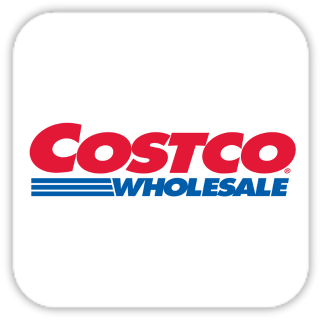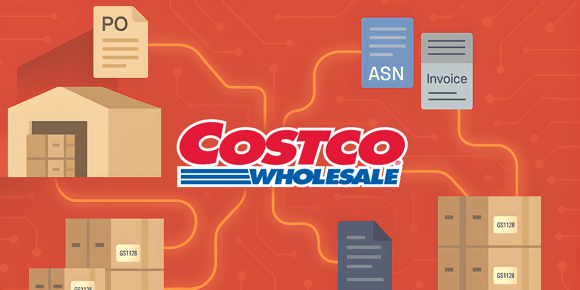On this page
Subscribe for updates
Keep up with OrderEase and access industry-leading order operation insights.
You’ve been approved as a Costco supplier. Before your first shipment leaves the dock, a 20-page EDI packet arrives along with testing requirements through SPS Commerce. That’s usually where the confusion starts.
The challenge isn’t compliance itself. It’s getting disconnected systems to share accurate data without costly errors.
EDI compliance is mandatory for all Costco suppliers. This guide explains the process, what SPS handles, how automation fits in, and how vendors can maintain compliance without manual duplication.
Costco operates 891 warehouses worldwide and reported $275.2 billion in revenue for fiscal 2025. Retail chargebacks can consume up to 5% of a supplier's annual revenue, making accurate, automated EDI operations essential.
👉 Learn more about how OrderEase Costco EDI Integration works.
Why Costco Made EDI Compliance Mandatory for All Suppliers
In 2024, Costco made full EDI compliance mandatory. The decision wasn’t about bureaucracy. It was about scale and accuracy.
With thousands of shipments moving daily, EDI gives Costco clear shipment visibility, consistent invoicing, and faster reconciliation. Each supplier must complete testing through SPS Commerce, Costco’s value-added network partner. SPS validates purchase orders (850), advance ship notices (856), invoices (810), and functional acknowledgments (997) before a vendor goes live.
Compliance helps suppliers, too. When data moves without interruption, payment follows faster.
For more context on how EDI transforms supply chain operations, read our post: Wholesale EDI: A Practical Guide for Suppliers and Vendors.
The Hidden Cost of Manual or Fragmented EDI Solutions
Manual uploads once worked. Today, they’re a liability.
Late ASNs trigger penalties or shipping holds. Incorrect GS1-128 labels can cost $5 to $10 per carton. Missing acknowledgments or mismatched invoices delay payment. Spreadsheets and portals only widen the gap between systems.
When every mislabeled carton represents a loss, automation becomes protection, not convenience.
👉 Related reading: What Are the Key Benefits of EDI for Modern Businesses?
Understanding Costco’s EDI Document Requirements
Costco’s EDI system uses defined X12 transactions that must transfer cleanly between your ERP and SPS:
|
Document |
Name |
Purpose |
|
850 |
Purchase order |
Sent by Costco to initiate a purchase |
|
855 |
PO acknowledgment |
Confirms receipt and acceptance |
|
856 |
Advance ship notice |
Details shipment information before delivery |
|
810 |
Invoice |
Requests payment after shipment |
|
997 |
Functional acknowledgment |
Confirms document receipt |
Labeling and Data Accuracy
Each pallet or carton must display a GS1-128 barcode with a unique SSCC (Serial Shipping Container Code). The data must match the 856 ASN hierarchy. Inaccurate labels can lead to chargebacks and result in delayed shipments.
Why Suppliers Fail EDI Certification (and How to Avoid It)
Most certification failures can be traced back to inconsistent data. Common causes include:
-
ASNs sent after freight departure
-
Invalid SSCC codes
-
Missing 997 acknowledgments
-
PO-invoice mismatches
-
Manual ERP edits during testing
Each failed test can delay certification by 2–4 weeks and impact vendor scorecards. Strong data discipline and automation prevent that.
Can I Use Any EDI Provider to Trade with Costco?
This is one of the most common supplier questions: “Do I have to use SPS Commerce if Costco does?”
The short answer is no, but you must still connect through SPS’s network.
Costco requires all suppliers to test and trade via SPS, which manages their VAN and certification. However, suppliers don’t need to operate SPS software directly.
OrderEase handles mapping, validation, and testing coordination on your behalf while staying within Costco’s certified framework.
👉 Learn how OrderEase Costco EDI Integration works.
How OrderEase Works With SPS Commerce
Costco uses SPS Commerce to manage its EDI testing and transmission network. You don’t need to license SPS software; you need to ensure that all traffic passes through their network and undergoes their certification process.
OrderEase connects directly to that system, managing your side of the exchange.
Here’s what happens behind the scenes:
-
OrderEase connects to SPS on behalf of the supplier.
-
We handle mappings, validation, test file exchange, and document flow management.
-
Suppliers don’t need separate SPS accounts.
-
All orders, ASNs, invoices, and acknowledgments are processed through a single ERP-connected workflow.
The OrderEase Difference
-
A single workflow inside your ERP, no portals or duplicate entry.
-
Pre-validation before SPS reviews.
-
GS1 label creation is linked directly to shipment data.
-
Multi-retailer readiness for other trading partners.
Automation ensures compliance, reduces errors, and accelerates turnaround.
Selling Online on Costco.com: What Vendors Need to Know
Costco.com operates separately from warehouse EDI. It’s a curated marketplace, not an open platform. Warehouse EDI runs through SPS Commerce; Costco.com transactions run through Rithum, formerly CommerceHub.
Both use GS1 and content standards, but digital shelf assets, photography, and lead times differ. Consistent automation keeps data aligned between both environments.
OrderEase synchronizes these data streams, combining warehouse and marketplace activity into one ERP-driven system.
The Automation Advantage: What Modern EDI Really Delivers
Legacy EDI relies on manual uploads, middleware, and reactive fixes. Automation changes that to proactive control.
|
Legacy EDI |
Automated EDI |
|
Manual uploads and VAN fees |
Direct ERP integration with SPS |
|
Reactive issue handling |
Real-time validation before submission |
|
Manual label creation |
Labels generated from shipment data |
|
Disconnected tracking |
Unified workflow |
|
Duplicate entry |
Single source of truth |
|
Delayed visibility |
Instant acknowledgments and live tracking |
|
Per-document pricing |
Scalable cost model |
Automation builds confidence that every transaction is validated, logged, and auditable before reaching SPS.
The Costco EDI Compliance Checklist
A quick reference for suppliers preparing for Costco’s EDI certification:
- Obtain a GS1 Company Prefix and SSCC template (GS1 US Verify Tools).
- Map all five EDI transactions (850, 855, 856, 810, 997).
- Validate ASN data before shipping.
- Match invoices to POs automatically.
- Monitor 997 acknowledgments daily.
- Submit and certify through SPS Commerce.
- Integrate EDI automation with your ERP or WMS.
Preventing Chargebacks and Shipping Delays
Late ASNs, incorrect labels, and invoice mismatches are the most common causes of deductions.
A Canadian food supplier reduced chargebacks by 85 percent after automating ASN validation and ERP synchronization.
Every chargeback begins as a data error. Automation catches it before it reaches the dock. Automation ensures proactive accuracy rather than reactive correction.
How Long Implementation Takes and What to Expect
|
Phase |
Activity |
Average duration |
|
1 |
Document mapping and label setup |
2–3 weeks |
|
2 |
SPS testing and certification |
2–4 weeks |
|
3 |
Go-live and monitoring |
1 week |
Implementation time depends on product complexity and SPS scheduling. Vendors using ERP-integrated EDI typically achieve ROI within six months.
Why OrderEase Is the Modern Choice for Costco Vendors
OrderEase works within Costco’s SPS framework, managing all supplier-side testing, mapping, validation, and live document flow.
We integrate with NetSuite, QuickBooks Enterprise, Microsoft Dynamics, Infor, and other leading systems.
OrderEase also manages both warehouse EDI and Costco.com marketplace automation within a single workflow.
Whether you’re onboarding or scaling, automation gives you confidence that every document, label, and invoice will pass on the first attempt.
Compliance Is the New Competitive Advantage
EDI compliance is a core part of Costco’s supply chain, and it is the system that keeps business moving.
SPS manages testing and certification. OrderEase handles automation, validation, and ERP integration. Together, they form a connected ecosystem that reduces risk, protects margins, and strengthens vendor relationships.


